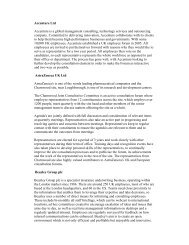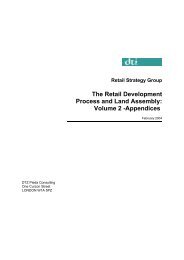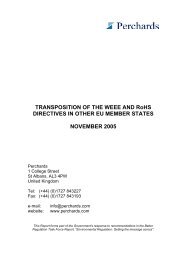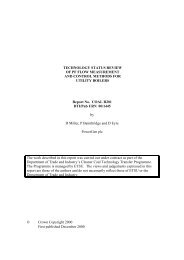Public Policy: Using Market-Based Approaches - Department for ...
Public Policy: Using Market-Based Approaches - Department for ...
Public Policy: Using Market-Based Approaches - Department for ...
Create successful ePaper yourself
Turn your PDF publications into a flip-book with our unique Google optimized e-Paper software.
<strong>Public</strong> <strong>Policy</strong>: <strong>Using</strong> <strong>Market</strong>-<strong>Based</strong> <strong>Approaches</strong><br />
IMPLEMENTATION ISSUES<br />
The main implementation issues in providing access to natural monopolies are:<br />
● excessive intervention;<br />
● asymmetric in<strong>for</strong>mation between the regulator and monopolist; and<br />
● the costs of regulation.<br />
The first issue arises because requiring access can reduce incentives <strong>for</strong> firms to<br />
invest in new assets. For this reason intervention has generally been limited to<br />
a small number of sectors, which in the UK are almost exclusively <strong>for</strong>mer<br />
nationalised industries.<br />
The second issue arises because the regulator will know less about the firm than<br />
its own managers. This issue can be particularly important in setting access<br />
charges and other terms and conditions, where asymmetric in<strong>for</strong>mation can<br />
lead to the setting of sub-optimal access fees. It can also lead to the firm inflating<br />
its costs, particularly in the period immediately be<strong>for</strong>e any review of its access<br />
charges.<br />
The third issue is in part a consequence of the asymmetric in<strong>for</strong>mation issue.<br />
That problem leads to the need <strong>for</strong> a well-resourced regulator and significant<br />
burdens on regulated firms in terms of the monitoring and reporting of<br />
in<strong>for</strong>mation on costs and quality of services. This burden can create significant<br />
costs of regulation. The process of opening up access, which may involve the<br />
restructuring of businesses to separate monopoly from competitive functions<br />
and the introduction of new systems to facilitate open access, can also lead to<br />
one-off and ongoing costs.<br />
All these factors need to be balanced against the benefits of opening up markets<br />
to greater competition.<br />
CONCLUSION<br />
Opening up access can bring the benefits of competition in terms of incentives<br />
<strong>for</strong> efficiency and innovation to the non-natural monopoly elements of an<br />
industry. However, it can also reduce the incentives <strong>for</strong> the monopoly element to<br />
undertake investment, and asymmetric in<strong>for</strong>mation may expose regulators to<br />
the potential <strong>for</strong> capture. The evidence outlined above suggests that in some<br />
industries, the resulting efficiency savings dominate the costs of regulation.<br />
However, ensuring the emergence of genuine competition in the contestable<br />
elements of the unbundled monopoly is crucial to realising the potential<br />
benefits, highlighting the importance of competition. This market mechanism is<br />
not considered in our case studies since there is already an extensive literature<br />
documenting the success of the mechanism, <strong>for</strong> example in the regulation of<br />
privatised network industries in the UK.<br />
68
















